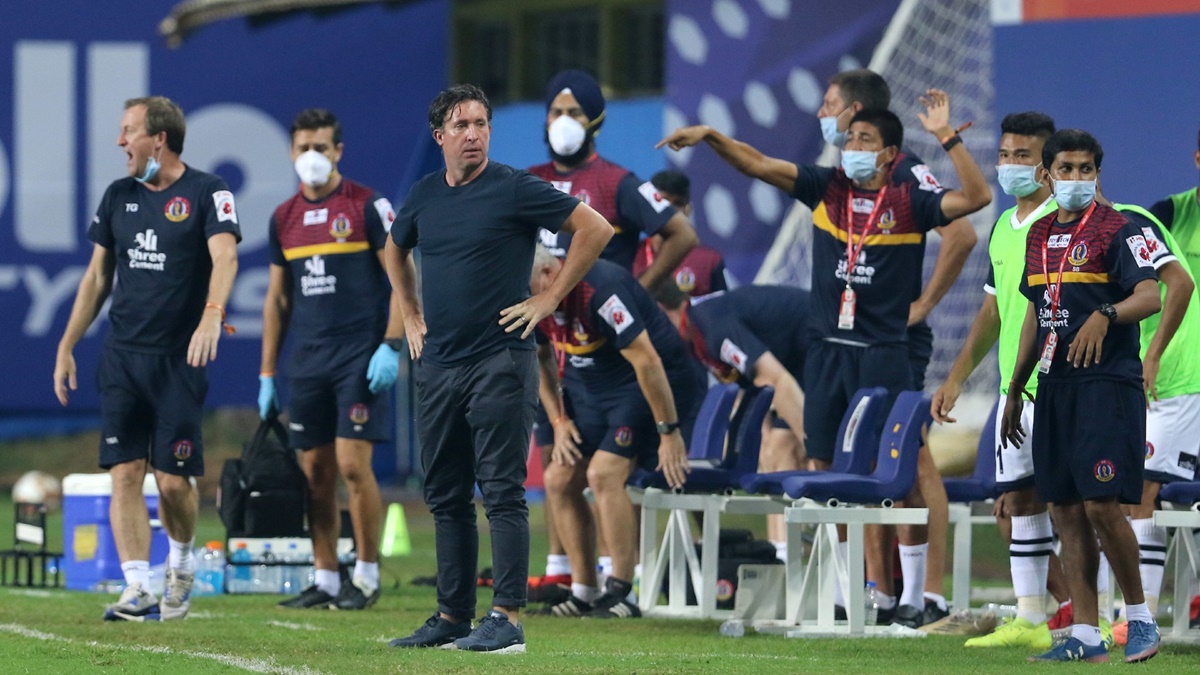 Robbie Fowler gestures during East Bengal's match against Northeast United FC (ISL)
Robbie Fowler gestures during East Bengal's match against Northeast United FC (ISL) Stuart Baxter chose the worst possible way to draw attention to one of the most contentious aspects of the Indian league: refereeing.
The Briton was, on Tuesday, sacked as Odisha’s manager for saying his players ‘would have to rape someone or get raped’ to get a refereeing decision in their favour. His departure, though, hasn’t ended the controversy surrounding the quality of officiating in the Indian Super League (ISL).
On Wednesday, the All India Football Federation’s (AIFF’s) disciplinary committee suspended East Bengal manager Robbie Fowler for four matches and imposed a fine of Rs 5 lakh for ‘insulting’ Indian referees.
But Fowler and Baxter – who chose wiser words in the past to criticise the referees – are not the only managers in the ISL who have spoken out against poor officiating. Almost all clubs, either through managers, players or management, have at some point during the season expressed anguish over some of the calls made by the referees.
This season, the criticism has been more pronounced than before and mistakes have been glaring. Coincidently, this is also the season when the ISL has employed the least number of referees.
According to the data available on the ISL’s website, the 15 referees appointed this season are six less than last season and three fewer than then 2016, 2017-18 and 2018-19 seasons. In 2015, ISL had 17 referees and the number was 16 in the inaugural season in 2014.
Of the 15, seven referees have taken charge in 60 out of the 81 matches played until Wednesday, meaning more workload, less time to recover and barely any time to assess their performances. Their workload increased further after the half-way mark in January, when two officials were removed from their duties due to repeated blunders in decision making.
“This year, maybe there is more stress on the referees because of the Covid situation,” says AIFF general secretary Kushal Das. “We have had to crunch our season in terms of the fixtures, which are on daily basis. The referees are missing the time to sit back and review their decisions. That’s why there is an additional pressure.”
But it’s not just about this season.
Poor refereeing has been a recurring theme in India’s domestic tournaments since the pre-ISL days. Goutam Kar, AIFF’s former head of referees, says this is because not enough attention has been given to train the match officials.
Just how lightly this issue was taken can be gauged from the fact that a referees’ department in the AIFF, which looked into match-day appointments and developmental aspects, was formed just 10 years ago.
“When we formed the department in 2011, we had one table, one chair and a few file covers. We had a list of around 11-12 referees from all over India but did not have any information about them. And one more thing we realised was that they received training just once in one or two years. That was very less,” Kar says.
The AIFF has an annual budget of approximately Rs 50 to 75 lakhs for activities related to referees, almost half of what some of the national team stars earn by playing in one season. The academies to develop referees have stopped and started and since the number of matches in the national league is among the fewest in the world, they lack the experience.
Das, though, says money is not an issue but lack of exposure is. “We have to accept the fact that the number of matches referees supervise in India is lesser than many football nations. So their exposure is limited,” he says. “We have tried to change that by collaborating with English Premier League’s match official’ board, called PGMOL, and are trying to come up with more ways to give them more matches to officiate in.”
Kar says when he left the role in 2018, the list of Indian referees had expanded to 272. However, there are just 18 referees in all of India who are qualified to officiate in FIFA-sanctioned international matches, most of whom are also officiating in the ISL.
“These are the best referees we have in the country but some decisions have been very surprising, to put it mildly,” says a team official. “They are not able to match the pace of the game sometimes. So, they are far away from the action and hence are not able to spot the fouls or give wrong decisions.”
There have been contentious offside decisions, wrong throw-ins awarded, goals disallowed and controversial send-offs. There has also been an incident where an AIFF committee reversed a referee’s decision to show a red card to East Bengal’s Danny Fox for a challenge on Goa’s Alexander Jesuraj.
The ISL has, in earlier seasons, tried to raise the standard by bringing in foreign officials, who got paid nearly 10 times more than their Indian counterparts on some occasions. That, too, did not make much of a difference.
Kar believes it is important to invest in the development of referees in the same way as improving the quality of players. “It’s important to professionalise refereeing, they must be able to sustain a good life through this job,” he says. “After all, the country’s refereeing standard also reflects the level of football.”